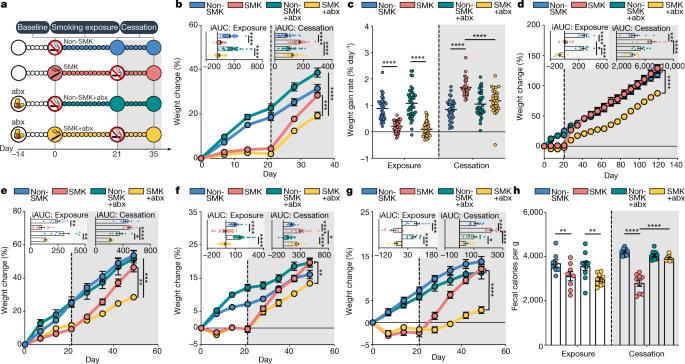Gut microbiota modulates weight gain in mice after discontinued smoke exposure
IF 50.5
1区 综合性期刊
Q1 MULTIDISCIPLINARY SCIENCES
引用次数: 27
Abstract
Cigarette smoking constitutes a leading global cause of morbidity and preventable death1, and most active smokers report a desire or recent attempt to quit2. Smoking-cessation-induced weight gain (SCWG; 4.5 kg reported to be gained on average per 6–12 months, >10 kg year–1 in 13% of those who stopped smoking3) constitutes a major obstacle to smoking abstinence4, even under stable5,6 or restricted7 caloric intake. Here we use a mouse model to demonstrate that smoking and cessation induce a dysbiotic state that is driven by an intestinal influx of cigarette-smoke-related metabolites. Microbiome depletion induced by treatment with antibiotics prevents SCWG. Conversely, fecal microbiome transplantation from mice previously exposed to cigarette smoke into germ-free mice naive to smoke exposure induces excessive weight gain across diets and mouse strains. Metabolically, microbiome-induced SCWG involves a concerted host and microbiome shunting of dietary choline to dimethylglycine driving increased gut energy harvest, coupled with the depletion of a cross-regulated weight-lowering metabolite, N-acetylglycine, and possibly by the effects of other differentially abundant cigarette-smoke-related metabolites. Dimethylglycine and N-acetylglycine may also modulate weight and associated adipose-tissue immunity under non-smoking conditions. Preliminary observations in a small cross-sectional human cohort support these findings, which calls for larger human trials to establish the relevance of this mechanism in active smokers. Collectively, we uncover a microbiome-dependent orchestration of SCWG that may be exploitable to improve smoking-cessation success and to correct metabolic perturbations even in non-smoking settings. A study of mice exposed to cigarette smoke suggests that smoking-cessation-induced weight gain is associated with a dysbiotic state that is driven by smoking-related metabolites.

肠道微生物群调节小鼠间断接触烟雾后的体重增加
吸烟是全球发病和可预防死亡的主要原因1,大多数吸烟者都表示希望戒烟或最近曾尝试戒烟2。戒烟引起的体重增加(SCWG;据报道平均每 6-12 个月增加 4.5 千克,13% 的戒烟者每年增加 10 千克3 )是戒烟的主要障碍4 ,即使在稳定5、6 或限制7 热量摄入的情况下也是如此。在这里,我们利用小鼠模型证明,吸烟和戒烟都会诱发肠道内与香烟烟雾相关的代谢物大量涌入所导致的菌群失调状态。用抗生素治疗诱导的微生物组耗竭可防止 SCWG。相反,将先前接触过香烟烟雾的小鼠的粪便微生物组移植到对烟雾接触无知觉的无菌小鼠体内,会诱发不同饮食和小鼠品系的体重过度增加。从代谢角度看,微生物组诱导的 SCWG 涉及宿主和微生物组的协同作用 将食物中的胆碱分流为二甲基甘氨酸,从而增加肠道的能量收获,同时消耗一种交叉调控的降低体重的代谢物--N-乙酰甘氨酸,还可能受到其他不同含量的香烟烟雾相关代谢物的影响。二甲基甘氨酸和 N-乙酰甘氨酸也可能在非吸烟条件下调节体重和相关脂肪组织免疫力。在一个小型横断面人类队列中的初步观察结果支持这些发现,这就要求进行更大规模的人体试验,以确定这一机制与活跃吸烟者的相关性。总之,我们发现了一种依赖于微生物组的SCWG协调机制,该机制可用于提高戒烟成功率,即使在不吸烟的情况下也能纠正代谢紊乱。对暴露于香烟烟雾中的小鼠进行的一项研究表明,戒烟引起的体重增加与吸烟相关代谢物驱动的菌群失调状态有关。
本文章由计算机程序翻译,如有差异,请以英文原文为准。
求助全文
约1分钟内获得全文
求助全文
来源期刊

Nature
综合性期刊-综合性期刊
CiteScore
90.00
自引率
1.20%
发文量
3652
审稿时长
3 months
期刊介绍:
Nature is a prestigious international journal that publishes peer-reviewed research in various scientific and technological fields. The selection of articles is based on criteria such as originality, importance, interdisciplinary relevance, timeliness, accessibility, elegance, and surprising conclusions. In addition to showcasing significant scientific advances, Nature delivers rapid, authoritative, insightful news, and interpretation of current and upcoming trends impacting science, scientists, and the broader public. The journal serves a dual purpose: firstly, to promptly share noteworthy scientific advances and foster discussions among scientists, and secondly, to ensure the swift dissemination of scientific results globally, emphasizing their significance for knowledge, culture, and daily life.
 求助内容:
求助内容: 应助结果提醒方式:
应助结果提醒方式:


